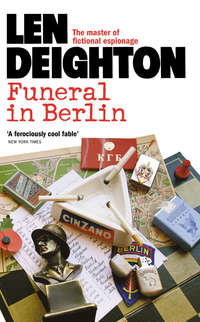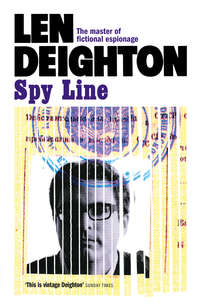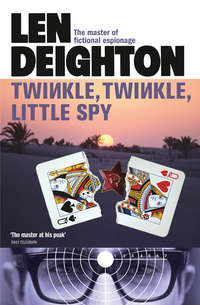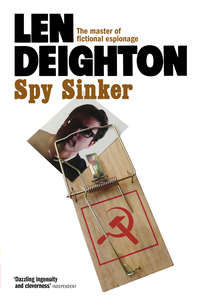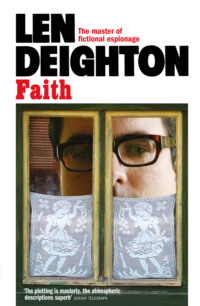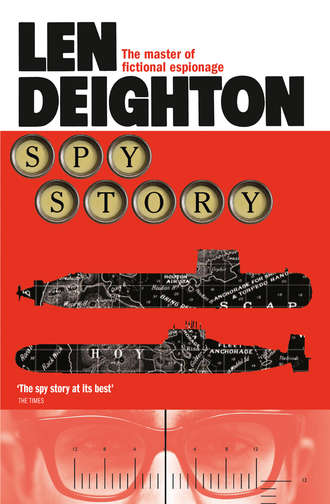
Полная версия
Spy Story
A black Ford Executive came past, drew in and parked ahead of us. Two men got out and walked back. The man with the sheepskin coat wound down the window. A man from the other car put a flashlight beam on my face. ‘Yes, that’s him.’
‘Is that you, Mason?’
‘Yes, sir.’ Mason was the one who did the weather print-outs and got himself photographed with strangers wearing my clothes.
‘Are you in on this, then?’ I said.
‘In on what?’ said Mason.
‘Don’t bullshit me, you little creep,’ I said.
‘Yes, that’s him,’ said Mason. He switched off the light.
‘Well, we knew it was,’ said the first cop.
‘Oh, sure,’ I said. ‘Or else I would have got you with only twenty-five pence on the clock.’ How could I have been so stupid. On that phone if you dialled TIM you’d hear the tick of the Chief Commissioner’s watch.
‘We’d better get you home,’ said the cop. ‘And thank you, Mr Mason.’
Mason let the driver open the door of the Executive for him as if to the manner born. That little bastard would wind up running the Centre, that much was clear.
They took me all the way home. ‘Next time,’ said the cop, ‘get car-pool transport. You’re entitled to it after a trip, you know that.’
‘You couldn’t get one of your people to collect my Mini Clubman – between games of bridge, I mean.’
‘I’ll report it stolen. The local bobbies will pick it up.’
‘I bet sometimes you wish you weren’t so honest,’ I said.
‘Goodnight, sir.’ It was still pouring with rain. I got out of the cab. They’d left me on the wrong side of the street. U-turns were forbidden.
3
All time is game time …
RULES. ALL GAMES. STUDIES CENTRE. LONDON
I let myself into the flat as quietly as possible. Marjorie turned up the heating whenever I was away, and now the stale air, heavy with fresh paint and unseasoned timber smells, hit me like a secondhand hangover. It would be a long time before I’d get used to living here.
‘Is that you, darling?’
‘Yes, love.’ I prodded at the pile of mail, pushing the unsealed buff envelopes aside until there remained only a postcard from a ski resort, Cross and Cockade magazine and a secondhand book about the Battle of Moscow. On the silver-plated toast rack – a place kept for urgent messages – there was a torn piece of hospital notepaper with ‘Please go to Colonel Schlegel’s home on Sunday. He’ll meet the ten o’clock train’ written on it in Marjorie’s neat handwriting. I’d have gone Monday except that Sunday was underlined three times, in the red pencil she used for diagrams.
‘Darling!’
‘I’m coming.’ I went into the sitting-room. When I was away she seldom went in there: a quick bout with the frying pan and a briefcase full of post-graduate medical studies on the bedside table was her routine. But now she’d got it all tidied and ready for my return: matches near the ashtray and slippers by the fireplace. There was even a big bunch of mixed flowers, arranged with fern and placed in a jug amid her copies of House and Garden on the side table.
‘I missed you, Marj.’
‘Hello, sailor.’
We embraced. The lingering smell of bacon I’d encountered in the hall was now a taste on her lips. She ran a hand through my hair to ruffle it. ‘It won’t come loose,’ I said. ‘They knit them into the scalp.’
‘Silly.’
‘Sorry I’m late.’
She turned her head and smiled shyly. She was like a little girl: her large green eyes and small white face, lost somewhere under that dishevelled black hair.
‘I made a stew but it’s a bit dried up.’
‘I’m not hungry.’
‘You haven’t noticed the flowers.’
‘Are you working in the mortuary again?’
‘Bastard,’ she said, but she kissed me softly.
In the corner, the box was keeping up its bombardment of superficial hysteria: British Equity outwits fat German extras shouting Schweinhund.
‘The flowers were from my mother. To wish me many happy returns.’
‘You’re not rerunning that twenty-ninth birthday again this year?’
She hit me in the ribs with the side of the hand and knew enough anatomy to make it hurt.
‘Take it easy,’ I gasped. ‘I’m only joking.’
‘Well, you save your lousy jokes for the boys on the submarine.’
But she put her arms round me and grabbed me tight. And she kissed me and stroked my face, trying to read her fortune in my eyes.
I kissed her again. It was more like the real thing this time.
‘I was beginning to wonder,’ she said, but the words were lost in my mouth.
There was a pot of coffee clipped into an electric contraption that kept it warm for hours. I poured some into Marjorie’s cup and sipped it. It tasted like iron filings with a dash of quinine. I pulled a face.
‘I’ll make more.’
‘No.’ I grabbed her arm. She made me neurotic with all this tender loving care. ‘Sit down, for God’s sake sit down.’ I reached over and took a piece of the chocolate bar she’d been eating. ‘I don’t want anything to eat or drink.’
The heroes on the box got the keys to a secret new aeroplane from this piggy-eyed Gestapo man, and this fat short-sighted sentry kept stamping and giving the Heil Hitler salute. The two English cats Heil Hitlered back, but they exchanged knowing smiles as they got in the plane.
‘I don’t know why I’m watching it,’ said Marjorie.
‘Seeing these films makes you wonder why we took six years to win that damned war,’ I said.
‘Take off your overcoat.’
‘I’m OK.’
‘Have you been drinking, darling?’ She smiled. She’d never seen me drunk but she was always suspecting I might be.
‘No.’
‘You’re shivering.’
I wanted to tell her about the flat and the photographs of the man who wasn’t me, but I knew she’d be sceptical. She was a doctor: they’re all like that. ‘Did the car give you trouble?’ she asked finally. She wanted only to be quite certain I wasn’t going to confess to another woman.
‘The plugs. Same as last time.’
‘Perhaps you should get the new one now, instead of waiting.’
‘Sure. And a sixty-foot ocean racer. Did you see Jack while I was away?’
‘He took me to lunch.’
‘Good old Jack.’
‘At the Savoy Grill.’
I nodded. Her estranged husband was a fashionable young paediatrician. The Savoy Grill was his works canteen. ‘Did you talk about the divorce?’
‘I told him I wanted no money.’
‘That pleased him, I’ll bet.’
‘Jack’s not like that.’
‘What is he like, Marjorie?’
She didn’t answer. We’d got as close as this to fighting about him before, but she was sensible enough to recognize male insecurity for what it was. She leaned forward and kissed my cheek. ‘You’re tired,’ she said.
‘I missed you, Marj.’
‘Did you really, darling?’
I nodded. On the table alongside her there was a pile of books: Pregnancy and Anaemia, Puerperal Anaemia, Bennett, Achresthic Anaemia, Wilkinson, A Clinical Study, by Schmidt and History of a Case of Anaemia, by Combe. Tucked under the books there was a bundle of loose-leaf pages, crammed with Marjorie’s tiny writing. I broke the chocolate bar lying next to the books and put a piece of it into Marjorie’s mouth.
‘The Los Angeles people came back to me. Now there’s a car and a house and a sabbatical fifth year.’
‘I wasn’t …’
‘Now don’t be tempted into lying. I know how your mind works.’
‘I’m pretty tired, Marj.’
‘Well, we’ll have to talk about things some time.’ It was the doctor speaking.
‘Yes.’
‘Lunch Thursday?’
‘Great,’ I said.
‘Sounds like it.’
‘Sensational, wonderful, I can’t wait.’
‘Sometimes I wonder how we got this far.’
I didn’t answer. I wondered too. She wanted me to admit that I couldn’t live without her. And I had the nasty feeling that as soon as I did that, she’d up and leave me. So we continued as we were: in love but determined not to admit it. Or worse: declaring our love in such a way that the other could not be sure.
‘Strangers on a train,’ said Marjorie.
‘What?’
‘We are – strangers on a train.’
I pulled a face, as if I didn’t understand what she was getting at. She pushed her hair back but it fell forward again. She pulled a clip from it and fastened it. It was a nervous movement, designed more to occupy her than to change her hair.
‘I’m sorry, love.’ I leaned forward and kissed her gently. ‘I’m really sorry. We’ll talk about it.’
‘On Thursday …’ she smiled, knowing that I’d promise anything to avoid the sort of discussion that she had in mind. ‘Your coat is wet. You’d better hang it up, it will wrinkle and need cleaning.’
‘Now, if you like. We’ll talk now, if that’s what you want.’
She shook her head. ‘We’re on our way to different destinations. That’s what I mean. When you get to where you’re going, you’ll get out. I know you. I know you too well.’
‘It’s you who gets offers … fantastic salaries from Los Angeles research institutes, reads up anaemia, and sends polite refusals that ensure an even better offer eventually comes.’
‘I know,’ she admitted, and kissed me in a distant and preoccupied way. ‘But I love you, darling. I mean really …’ She gave an attractive little laugh. ‘You make me feel someone. The way you just take it for granted that I could go to America and do that damned job …’ She shrugged. ‘Sometimes I wish you weren’t so damned encouraging. I wish you were bossy, even. There are times when I wish you’d insist I stayed at home and did the washing-up.’
Well, you can’t make women happy, that’s a kind of fundamental law of the universe. You try and make them happy and they’ll never forgive you for revealing to them that they can’t be.
‘So do the washing-up,’ I said. I put my arm round her. The wool dress was thin. I could feel that her skin was hot beneath it. Perhaps she was running a fever, or perhaps it was passion. Or perhaps I was just the icy cold bastard that she so often accused me of being.
‘Are you sure you wouldn’t like a bacon sandwich?’
I shook my head. ‘Marjorie,’ I said, ‘do you remember the caretaker at number eighteen?’ I walked across to the TV and switched it off.
‘No. Should I?’
‘Be serious for a moment … Charlie the caretaker. Charlie Short … moustache, cockney accent – always making jokes about the landlords.’
‘No.’
‘Think for a moment.’
‘No need to shout.’
‘Can’t you remember the dinner party … he climbed in the window to let you in when you’d lost your key?’
‘That must have been one of your other girls,’ said Marjorie archly.
I smiled but said nothing.
‘You don’t look very well,’ said Marjorie. ‘Did anything happen on the trip?’
‘No.’
‘I worry about you. You look pretty done in.’
‘Is that a professional opinion, Doctor?’
She screwed her face up, like a little girl playing doctors and nurses. ‘Yes, it is, honestly, darling.’
‘The diagnosis?’
‘Well it’s not anaemia.’ She laughed. She was very beautiful. Even more beautiful when she laughed.
‘And what do you usually prescribe for men in my condition, Doc?’
‘Bed,’ she said. ‘Definitely bed.’ She laughed and undid my tie.
‘You’re shaking.’ She said it with some alarm. I was shaking. The trip, the journey home, the weather, that damned number eighteen where I was now in mass production, had all got to me suddenly, but how do you explain that? I mean, how do you explain it to a doctor?
4
The senior officer in Control Suite at commencement of game is CONTROL. Change of CONTROL must be communicated to Red Suite and Blue Suite (and any additional commanders), in advance and in writing. CONTROL’S ruling is final.
RULES. ‘TACWARGAME’. STUDIES CENTRE. LONDON
You might think you know your boss, but you don’t. Not unless you’ve seen him at home on Sunday.
There are only three trains to Little Omber on Sunday. The one I caught was almost empty except for a couple of Saturday-night revellers, three couples taking babies to show Mums, two priests going to the seminary and half a dozen soldiers connecting with the express.
Little Omber is only thirty-five miles from central London but it is remote, and rural in a genteel way: frozen fish fingers, and picture-window housing-estates for the young executive.
I waited at the deserted railway station. I hardly knew Charles Schlegel the third, Colonel US Marine Corps Wing (retired), so I was expecting anything from a psychedelic Mini to a chauffeured Rover. He’d taken over the Studies Centre only ten days before I’d gone off on my last sea trip, and our acquaintance had been limited to a Charles Atlas handshake and a blurred glimpse of a pin-striped Savile Row three piece, and a Royal Aero Club tie. But that didn’t mean that he hadn’t already scared the shit out of half the staff, from the switchboard matron to the night door-keeper. There was a rumour that he’d been put in to find an excuse for closing the Centre down, in support of which he was authoritatively quoted as saying we were ‘an antediluvian charity, providing retired limey admirals with a chance to win on the War Games Table the battles they’d screwed up in real life’.
We all resented that remark because it was gratuitous, discourteous and a reflection on all of us. And we wondered how he’d found out.
Bright red export model XKE – well, why didn’t I guess. He came out of it like an Olympics hurdler and grasped my hand firmly and held my elbow, too, so that I couldn’t shake myself free. ‘It must have got in early,’ he said resentfully. He consulted a large multi-faced wristwatch of the sort that can time high-speed races under water. He was wearing charcoal trousers, hand-made brogues, a bright-red woollen shirt that exactly matched his car, and a shiny green flying jacket, with lots of Mickey Mouse on sleeves and chest.
‘I screwed up your Sunday,’ he said. I nodded. He was short and thickset, with that puffed-chest stance that small athletes have. The red shirt, and the way he cocked his head to one side, made him look like a gigantic and predatory robin redbreast. He strutted around the car and opened the door for me, smiling as he did so. He wasn’t about to apologize.
‘Come on up to the house for a sandwich.’
‘I have to get back,’ I argued without conviction.
‘Just a sandwich.’
‘Yes, sir.’
He let in the clutch, and heel-and-toed like a rally driver. He gave the car the same sort of attention that I suppose he’d given his F-4 or his B-52 or his desk, or whatever it was he flew before they unleashed him onto us. ‘I’m glad it was you,’ he said. ‘You know why I say that?’
‘Man management?’
He gave me a little you’ll-find-out-buddy smile.
‘I’m glad it was you,’ he explained slowly and patiently, ‘because I haven’t had a chance of a pow-wow with you or Foxwell, on account of the mission.’
I nodded. I liked the glad-it-was-you stuff. You’d have thought the message said anyone who’d like a free train ride to Little Omber this Sunday could go.
‘Goddamned imbecile,’ he muttered as he overtook a Sunday driver tooling down the white line, chatting with his kids in the back seat.
Close to Schlegel, I could see that the sun-lamp tan was there to disguise the complicated surgery he’d had on his jaw. What from a distance might look like the legacy of acne was a pattern of tiny scars that gave one side of his face the permanent hint of a scowl. Sometimes his face puckered enough to bare his teeth in a curious lopsided humourless smile. He did one now. ‘I can imagine,’ he said. ‘Yank trouble-shooter, hundred missions in Nam. They probably are saying I’m a hatchet man.’ He paused. ‘Are they saying that?’
‘I’ve heard it whispered.’
‘What else?’
‘They are saying that you are taking the staff aside one by one and giving them a working over.’ They weren’t saying that – as far as I knew – but I wanted to get his reaction.
‘Like this?’
‘Let’s wait and see.’
‘Huh.’ He did that crooked smile again. He slowed to go through the village. This was really home-counties stuff: six shops and five of them selling real estate. It was the kind of authentic English village that only Germans, Americans and real-estate men can afford. At the far end of the village there were four locals in their Sunday clothes. They turned to watch us pass. Schlegel gave them a stiff-armed salutation like the ones in that old English war film. They nodded and smiled. He turned off the road at a plastic sign that said ‘Golden Acre Cottage. Schlegel’ in ye olde English lettering. He gunned the motor up the steep track and fired gravel and soft earth from the deep-tread tyres.
‘Nice place,’ I said, but Schlegel seemed to read my thoughts. He said, ‘When they cut my orders they said I must be within easy access of NATO/ASW down the road at Longford Magna. Your government won’t let us Yanks buy a place to live – by law, by law! And half the county is owned by the same English lord who’s got his finger in my eye.’ He slammed on the brakes and we slid to a halt inches short of his front door. ‘A goddamn lord!’
‘You haven’t started Chas off about the landlord, I hope,’ said a woman from the doorway.
‘This is my bride, Helen. There are two daughters and a son around the house someplace.’
He’d parked outside a large thatched cottage, with black cruck-frame timbers and freshly whitened plaster. Placed on the front lawn there was a very old single-furrow plough and over the front door there was a farming implement that I didn’t recognize. The daughters arrived before I was even half out of the car. Slim, fresh-faced, clad in jeans and brightly coloured lambswool sweaters, it was difficult to tell wife from teenage daughters.
‘What a wonderful thatching job,’ I said.
‘Plastic,’ said Schlegel. ‘Real thatch harbours vermin. Plastic is cleaner, quicker and longer lasting.’
Mrs Schlegel said, ‘Gee, Chas, you should have told me. I was only doing BLTs for lunch.’
‘BLTs, Helen! You want to send him into a state of shock? These Brits strike into roast beef with all the trimmings for Sunday lunch.’
‘A bacon, lettuce and tomato sandwich will be fine, Mrs Schlegel.’
‘Helen, call me Helen. I sure hope Chas hasn’t been too rude about our English landlord.’
The Southern United States – its climate and terrain so suitable for training infantry and aviators – has played a part in moulding the character of American military men. And it is there that so disproportionately many of them met their wives. But Mrs Schlegel was no Southern belle. She was a New Englander, with all the crisp assurance of that canny breed.
‘He’d have to be a lot ruder before he could hope to offend me … er … Helen.’ The sitting-room had a big log fire perfuming the centrally heated air.
‘A drink?’
‘Anything.’
‘Chuck made a jug of Bloody Marys before going to meet you.’ She was no longer young, but you could have prised that snub nose and freckled face out of a Coke commercial. The teenager’s grin, the torn jeans and relaxed hands-in-pocket stance made me happy to be there.
‘That sounds just right,’ I said.
‘You Englishmen … that cute accent. That really gets to me. Do you know that?’ she asked her husband.
‘We’ll go into the den, Helen. He’s brought me some junk from the office.’
‘Take the drinks with you,’ said Mrs Schlegel. She poured them from a huge frosted glass jug. I sipped at mine and coughed.
‘Chas likes them strong,’ said Mrs Schlegel. At that moment a small child came through the sitting-room. He wore a Che Guevara sweatshirt, and, with arms outstretched, dumped small clods of garden earth upon the carpet while emitting a steady high-pitched scream.
‘Chuckie!’ said Mrs Schlegel mildly. She turned to me. ‘I suppose here in Britain any mother would beat the daylights out of a child for doing that.’
‘No, I believe there are still a few who don’t,’ I told her. We could hear the scream continue out into the garden and around the back of the house.
‘We’ll be up in the den,’ said Schlegel. He’d downed half of his drink and now he poured himself more and added some to my glass too. I followed him through the room. There were black timber beams across the ceiling, each one decorated with horse brasses and bridle fittings. I hit my head on the lowest one.
We went up a narrow wooden staircase that creaked at each step. Off the passage at the top of it there was a small box room with a ‘Do not disturb’ label from the Istanbul Hilton. He pushed the door open with his elbow. The screaming child came nearer. Once inside Schlegel bolted the door.
He sat down heavily, and sighed. He had a rubbery face, well suited to his habit of pummelling it with his hands, pushing at his cheeks, bending his nose and then baring his teeth, as if to be sure that all the muscles were in working order. ‘I hate lords,’ he said. He fixed me with an unwinking stare.
‘Don’t look at me,’ I said.
‘Aw, I don’t mean that,’ he said. ‘Hell, no one would take you for a lord.’
‘Oh well,’ I said, trying to sound indifferent.
From Schlegel’s den there was a view of the surrounding country. A clump of poplar trees were bare, except for bunches of mistletoe, and the birds that rested there before coming down to join in the feast of holly berries. The gate to the next field was open, and the cart tracks shone with ice all the way round the side of the hill over which the steeple of Little Omber church could be seen. Its bell began striking twelve. Schlegel looked at his watch. ‘Now that damned village clock is fast too,’ he said.
I smiled. That was the essence of Schlegel, as I was to find out.
‘Bring good stuff this time?’
‘I’ll let you know when we see the analysis.’
‘Can’t you tell when you’re out there monitoring it?’
‘One trip last year they found the Russians working a new Northern Fleet frequency. The monitor leader got permission to change the cruise route to get cross-bearings. They brought in forty-three fixed-position Russian radio stations. There was talk of some kind of citation.’
‘And … ?’ said Schlegel.
‘Buoys. Meteorological stations, some of them unmanned.’
‘But it wasn’t you.’
‘I’ve always been on the cautious side.’
‘It’s not a word you’d want on your fitness report in the Marine Corps.’
‘But I’m not in the Marine Corps,’ I said.
‘And neither am I any longer – is that what you were about to say?’
‘I wasn’t going to say anything, Colonel.’
‘Drink up. If your new stuff is anything like the analysis I’ve been reading, I want to War Game the results and submit them for next summer’s NATO exercises.’
‘It’s been suggested before.’
‘It’s a hardy annual, I know that. But I think I might do it.’
If he was expecting a round of applause he was disappointed.
He said, ‘You’ll see some dough pumped into the Centre if they agree to that one.’
‘Well, that’s just fine for the controller of finance.’
‘And for the Studies Director, you mean?’
‘If we ever use the stuff we’re picking up on these trips as a basis for NATO fleet exercises, you’ll see the Russians really light up and say tilt.’
‘How?’ He bit into a cigar and offered them. I shook my head.
‘How? For starters the C-in-C will recognize the NATO movements as their alert scheme, and he’ll guess that these sub trips must be collecting! He’ll hammer the First Deputy who will get the War Soviet into a froth … bad news, Colonel.’
‘You mean this is all something we should be at pains to avoid.’
‘Then you are reading me correctly,’ I said. ‘They’ll know for certain that we have subs on the ocean floor outside Archangel, they’ll surmise about the Amderma and Dikson patrols. And then maybe they’ll guess what we are doing in the River Ob. Bad news, Colonel.’


